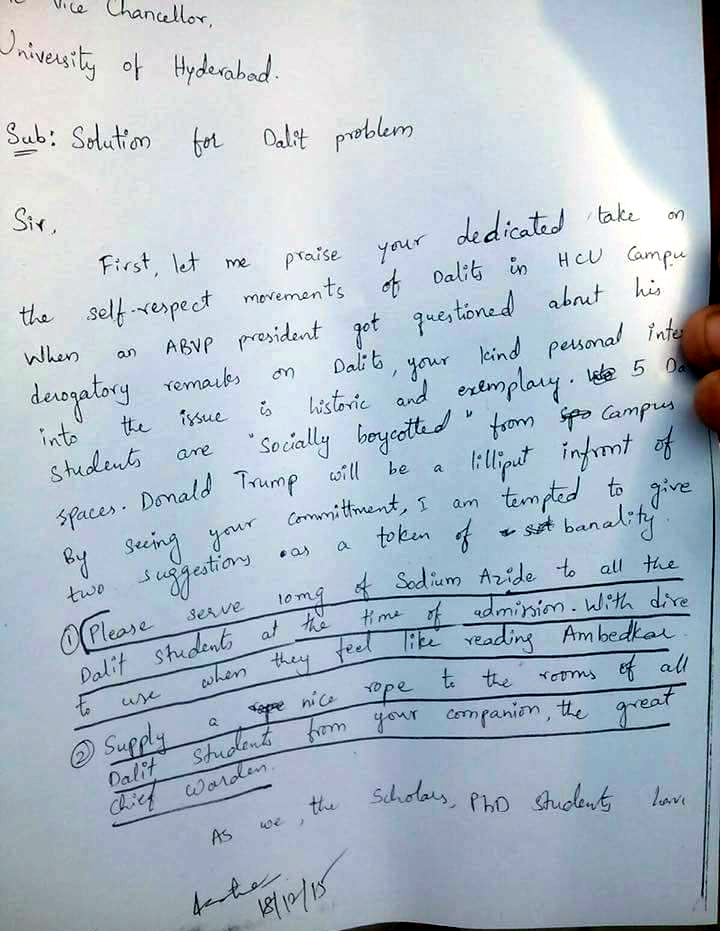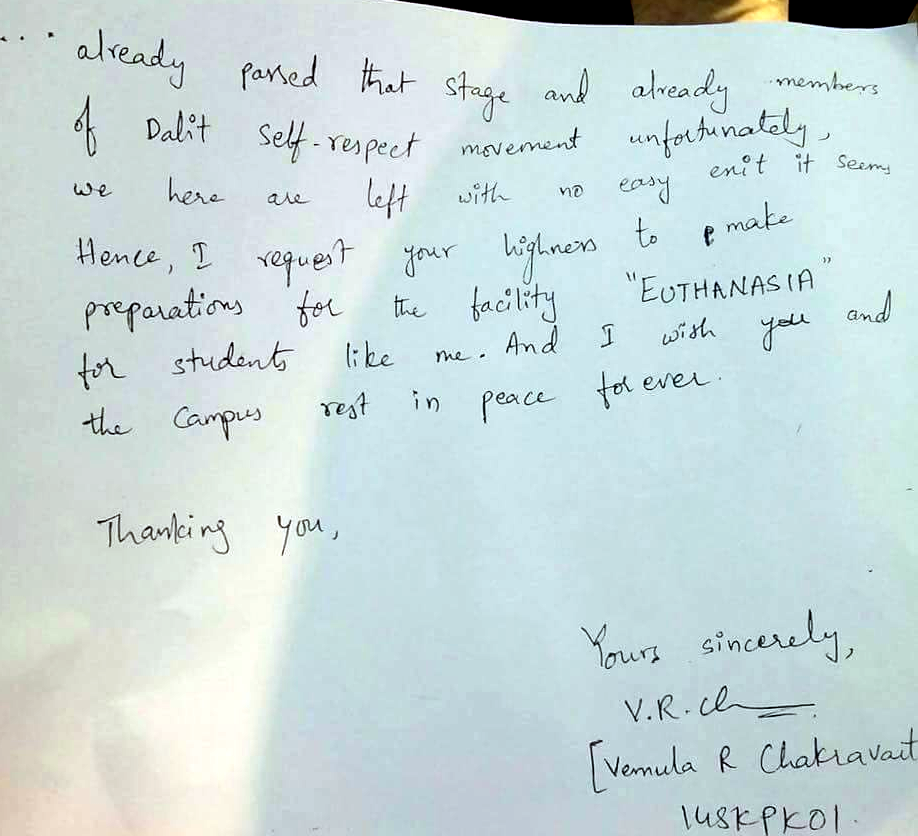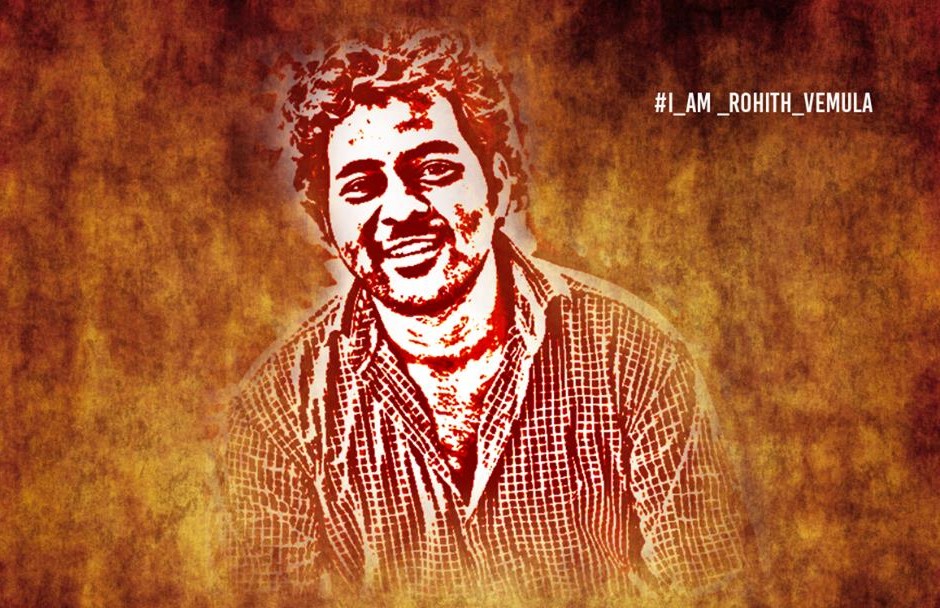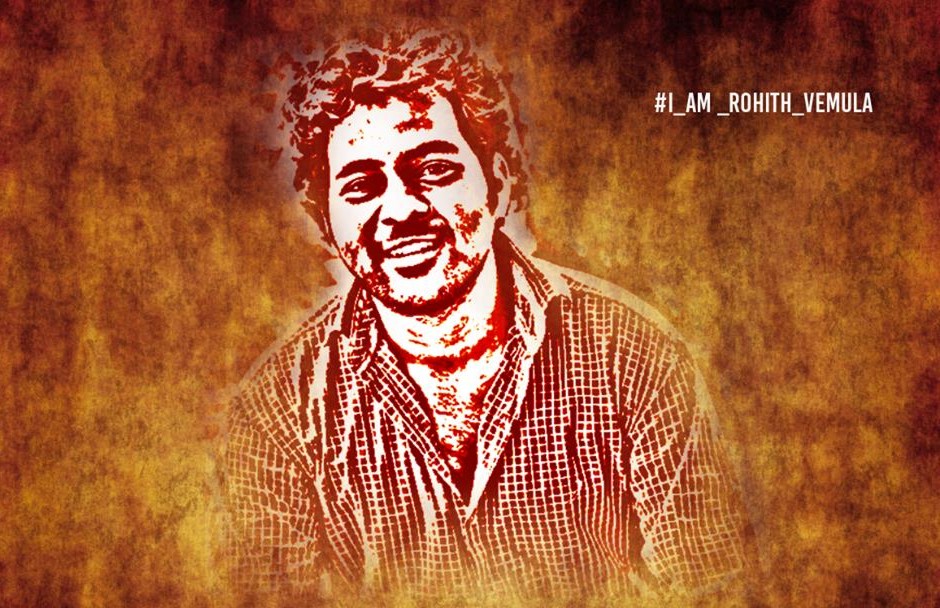First published on January 19, 2016
Supply Sodium Cynanide and a Rope to every Dalit student-Rohit to the VC a month before he took his life
This letter, dated December 18, 2015 has not been so widely quoted nor has it gone viral. It is a comment on all of us, especially those of us in the media, that we failed to read the warnings or feel the anguish. After all it is since August 2015 that the social boycott and ostracizing of Dalit students, including Rohith was systematically afoot. That is close to five months ago.
Nearly a month to the day that he tragically gave up the struggle to live and took his own life, on December 18, 2015, a hand-written letter from Rohith Vemula to Vice Chancellor Appa Rao says it all. Taunting and tragic, the note will now be read as a precursor of what was to come. In a hand-written scrawl that hints at acute desperation, he says, “Your Excellency (addressed to the Vice Chancellor Appa Rao) “make preparations for the EUTHANASIA for students like me from the Ambedkarite movement…and may your campus rest in peace forever.”
The letter traces the officially sanctioned “social boycott” of Dalit students after they took on a member of the Akhil Bharatiya Vidyarthi Parishad (ABVP) for his derogatory remarks to the Dalit students. “Donald Trump will be a Lilliput in front of you,” Rohith tells Appa Rao then offering a piece of chilling advice. “Please serve 10 miligram of Sodium Azide to all the Dalit students at the time of admission…Supply a nice rope to the rooms of all Dalits students..”The text of the letter can be read here and a scanned hand written copy seen here.


Now we know, and fret over the fact that his Rs 25,000 per month stipend (as of all his other suspended colleagues) was stopped after suspension and he had to borrow money, even from home, to survive the struggle. Now that he is dead we listen to the plight and anguish of his family. Why did we not listen before? As the isolation and anguish built up to make Rohith take a step so final that it signalled no return? Yes, we are all to blame.
“After the stipend was stopped, his family was struggling to support him. He borrowed Rs 40,000 from a friend and was living frugally. Almost every day, he used to say that his money was stuck,’’ said Velmula Sankanna, a fellow PhD scholar and one of the other five students who were suspended. “In December, Rohith wrote an angry letter to the V-C, sarcastically asking him to provide euthanasia facilities for Dalit students. Since then, he was scared to go to the administration building and ask about his stipend. He became silent and withdrawn. He said that he was falling into depression because he was being defeated by the system at every turn. He blamed himself, his caste, and the circumstances around him. He did not take much interest in anything except studies,’’ added Sankanna, a close friend.
We did not rise to feel, see or appreciate the seriousness implicit in the warnings. In August 2015, a questionable mode of ‘suspension’ of five singled out students of the Ambedkar Students Association (ASA) followed by the arbitrary stopping of their scholarship stipend, further followed by their being locked out of their rooms from January 4, 2016. Yet they fought on, sleeping out near the shopping complex in the cold. Awaiting fair hearing, democratic space for protest(s) and justice.
From the night of January 4, 2016 until today the sleep out protests continue.
After the tragic and unnecessary loss of the life of a budding science scholar, a proud Ambedkarite, will justice and fair hearing happen? Yesterday in a fully articulated representation to PL Punia, Chairperson of the National Scheduled Caste and Scheduled Commission, the Joint Action Committee for Social Justice, University of Hyderabad (UoH) has demanded:
- Punish the Culprits under the SC/ST Atrocities Act:
- Banadaru Dattareya, Union Cabinet Minister of State for Labour and Employment
- P Appa Rao, Vice Chancellor
- Professor Alok Pandey, Chief Proctor
- Susheel Kumar, ABVP President
- Ramchandra Rao, MLC
- Remove P Appa Rao from the post of Vice Chancellor
- Employ a family member of Rohith Vemula at the University of Hyderabad and give his family Rs 50 lahs in compensation
- Drop the fabricated cases against five Dalit Research Scholars immediately and unconditionally
- Revoke the suspension of Students immediately and unconditionally
The Anger Spreads; Demands for resignation of Vice Chancellor Appa Rao
Anger and grief are potent combinations and both were visible in plenty at the mortuary of the Osmania Hospital on Monday, January 18 where Rohith Velumal lay, a day after he tragically ended his own life. His mother’s anguished cry says it all, ““I used to proudly tell everyone in my village that my son was doing PhD at Hyderabad University. Today, I have come to collect his dead body.’’ The family is from Gurazala near Guntur, his mother a tailor and father, Manikumar a security guard at the Hyderabad University. Rohith has two siblings, an elder sister and a younger brother.
Over 1200 students of the University of Hyderabad (UoH) participated in a rally on Monday evening and have resolved to protest on Tuesday, January 19 and not allow the university to function until the current Vice Chancellor, Appa Rao steps down. Before the rally, his close friends and colleagues, along with his family were present at the cremation of Rohith in Hyderabad. (see Image story)
Simultaneous and spontaneous protests continued through the day yesterday at Hyderabad, Vishakhapatnam, Mumbai and Delhi. The road outside Shastri Bhavan, the office of Smriti Irani, the Ministry for Human Resources Development (MHRD) was cordoned off akin to a war zone (see pictures). In Hyderabad, a visit from the chairperson of the Scheduled Caste/Scheduled Tribes Commission allayed feelings somewhat.
Though it is Rohith is the one who has made the most recent and most tragic sacrifice, the question is whether it will still open India’s eyes and hearts?
We read every other day not just of the social boycott of Dalit children in the mid day meal schemes. In ‘Dravidian’ politics ruled Tamil Nadu colour bands on Dalit students brand them with their caste. There is little political, social or cultural outrage. The television channels, packed as they are with ‘journalists’ most of whom sport a myopic caste consciousness of the elite Indian that simply excludes any mention of discrimination or exclusion while badgering home ‘the banner of tolerance’, rarely flag anti-Dalit atrocities as an institutional ill to be faced squarely then remedied.
In ‘progressive’ west India the discrimination takes similar forms, and examples abound. In Phugana, three young Dalit children, one a baby was burnt alive in a burst of Rajput rage.
Just like the Blacks fought (and have barely won) the Civil Rights battle in the West – last year’s incidents at Fergusson are evidence of how thinly layered this success is –it is privileged India, caste Hindus who need to hang their heads in acknowledgement, first, and the, shame.
We need to internalize what Dalit students experience when they enter schools, colleges and universities and break the glass ceiling and enter India’s famed institutions of higher learning, the IITs, the IIMs and Universities.
Not only is the percentage of Dalit students who enter higher educational institutions small. They are subject to insidious caste practices and exclusion that batters the hard earned self-esteem. A dangerous argument of ‘meritocracy’ cloaks well organized money and caste induced privilege.
This everyday institutional and societal exclusion and othering needs to be acknowledged squarely by each and one of us.
It is time we ask difficult ourselves some hard and uncomfortable questions.
What kind of history do we teach? Who are our heroines and heroes?
How many Dalits are there in the media, print and television?
How many Dalits in Institutions of power and governance?
The Dalit experience says that entering the corridors of elite educational institutions like Indian Institute of Technologies (IIT) and Indian Institute of Managements and Central Universities for scores of Dalit students is like walking into a living hell, where the fear of being shamed and humiliated hangs heavy on the heart and soul of every student.
Before Rohit, we lost Senthil Kumar and Nagaralu Koppalas, also in the Central University of Hyderabad. Have these earlier losses, deaths of young men in their prime been internalized and taught the UoH any lessons worth learning? The recent and continuing unfair suspension of Dalit scholars would appear to suggest that no lessons have yet been learned.
Is India willing ready and able to accept her Not So Hidden Apartheid?

